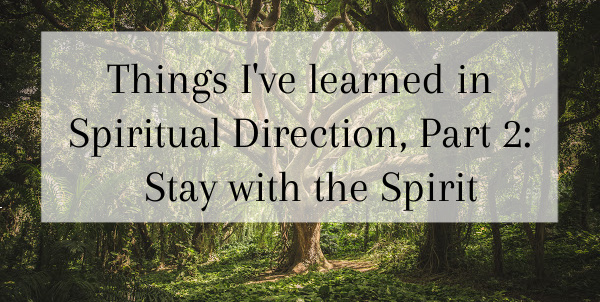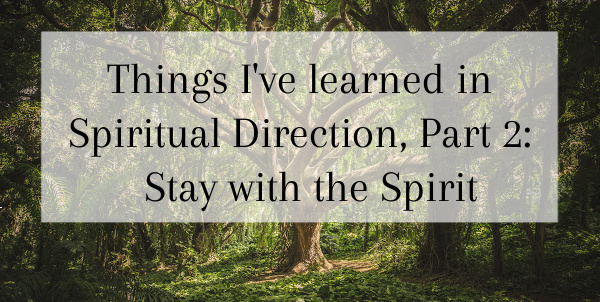There’s a certain timelessness we can feel while in conversation about eternal things: God, our soul, and the revelation of the work the Lord is doing to draw us ever closer to Him. As if everything else is suspended for a few moments and we hang up high from a golden thread, looking curiously at life from above. The big picture. The sacred story.
Then maybe we seem to be deep within the crevices of our hearts, holding up lanterns in the long-buried, undiscovered, rubble-covered caverns of longing and emptiness and capacity for God. The underground work. The hidden places. Where there is no movement of sun and moon, no passing of time.
And nothing there can be rushed.
I have noticed the masterful way my spiritual director creates a sense of eternity by stilling all the externals in our meetings. She makes me feel as if there is nothing else going on in the world, that these words between us—that they are all that matter. And that we can sit with a single word until all of its meaning has been fleshed out and given shape and dimension and integrated into the story of my soul.
And that is something I’ve come to realize must be applied in prayer as well, in our conversations with God over scripture, over images, over the thoughts He inspires in us and the words we are given that we know are from Him. Over the stories and sayings of saints we stumble upon and the way they strike us as if to say, Stop. There is something here for you. Like a small, holy snag holding us in a single place.
Do we still ourselves and sit with these sacred things? Or do we move on, with our eight-second attention spans, and look for the next ‘hit’ of inspiration, beauty, or insight?
This brings me to the second thing I’ve learned in spiritual direction: Stay with the Spirit.
When a word, a verse, a scripture passage, a sacred image, or a saint arrests your attention—linger there. Believe that there are layers of meaning to be uncovered. Prepare your heart for a particular grace to be harvested. Fight the temptation to move on to something else, assuming that you’ve gleaned everything in one sitting.
Will I shrug God’s right hand away in my impatience to finish the chapter? Will I cut Him off in mid-sentence or turn the page before the words have finished unfolding?
Sometimes, we simply have to give God the time and space to finish what He begins.
Whenever you enter a house, stay there until…” (Mark 6:10)
until you have received a particular grace or inspiration.
until you have understood on a deeper level.
until you have surrendered something required to advance.
until your adoration has moved into an obedient yes to the next right thing.
Until.
Last year in my prayer I kept coming back to the image of a massive, beautiful tree—twisted and arching, ancient but very much alive. I couldn’t leave the protective presence of that tree. I didn’t understand why my prayerful imagination had me there, but whenever I prayed I wanted to be by that tree.
“Stay with the tree,” my director said simply, even though it began to feel silly. I was almost apologetic: “I’m still by the tree,” I’d admit. But there was no hurry to move away.
That life-giving tree was magnetic. It symbolized the unchanging presence of grace in my inner garden, and it anchored me in a powerful way during some difficult seasons. Eventually, my prayer moved on. But if I had brushed off the invitation to stay with the Lord by that tree, I would have left the Holy Spirit alone under the branches and missed His slow and subtle movements.
Another time I was praying with Psalm 73:
Nevertheless, I am continually with you;
you hold my right hand.
You guide me with your counsel,
and afterward you will receive me to glory.
Whom have I in heaven but you?
And there is nothing on earth that I desire besides you.
My flesh and my heart may fail,
but God is the strength of my heart and my portion forever.
Two words in those verses seemed to jump off the page. Two small and seemingly insignificant words:
But God.
My spirit leaped over those words as if I had never heard them before. I carried those words in my heart for weeks, repeating them over and over. They held a promise, a miracle, a paradox, a reversal—they reminded me Who had the last word. I discovered them over and over in the Bible, more times than I can tell.
You intended to harm me, but God intended it for good to accomplish what is now being done, the saving of many lives. (Gen 50:20)
David stayed in the desert strongholds and in the hills of the Desert of Ziph. Day after day Saul searched for him, but Goddid not give David into his hands. (1 Samuel 23:14)
They are like sheep and are destined to die. . . .But God will redeem me from the realm of the dead; he will surely take me to himself. (Psalm 49:14-15)
You killed the author of life, but God raised him from the dead. (Acts 3:15)
And you were dead in the trespasses and sins. . . and were by nature children of wrath, like the rest of mankind. But God, being rich in mercy, because of the great love with which he loved us even when we were dead in our trespasses, made us alive together with Christ—by grace you have been saved . . .(Ephesians 2:1,3;4-5)
I marveled over “But God” for weeks. Until they were simply a part of me, I held onto them. Every time I prayed, they sank a little deeper in my heart. There is nothing in your life, I heard in each “but God” verse, that cannot be instantly made new with those two words. And I slowly came to claim that promise.
If I had glossed over that phrase, anxious to find some weightier words to be inspired by, I would have missed a massive grace.
Now, I’m sure I’ve skipped right over the Holy Spirit many times. Could my pulling away be boredom, impatience, restlessness, or resistance? It’s hard to do the deep work. It’s even harder because we live in a culture and an age of diversion, distraction and instant gratification.
We’d like our graces served up pre-packaged and ready at the drive-through window. With a side of virtue and a helping of holiness to go. After all, we’ve got places to go and people to serve. We’ve got ministries to run. All the things.
Incidentally, we do have to be sure that when we are ‘staying’ in with something in prayer it is not with a grasping or clinging to a consolation or experience of prayer — trying to re-create a grace. Gifts are given and received in total freedom. They cannot be clutched, but they should also not be tossed aside after a single taste.
For the Kingdom is a banquet, the slowly savored kind, and the Lord pulls out a chair and invites us to linger for a while.
Missed the first post? You can find it here.
Image (modified) courtesy of Unsplash.
This article appears here courtesy of our friends at SpiritualDirection.com and is reprinted with kind permission.















